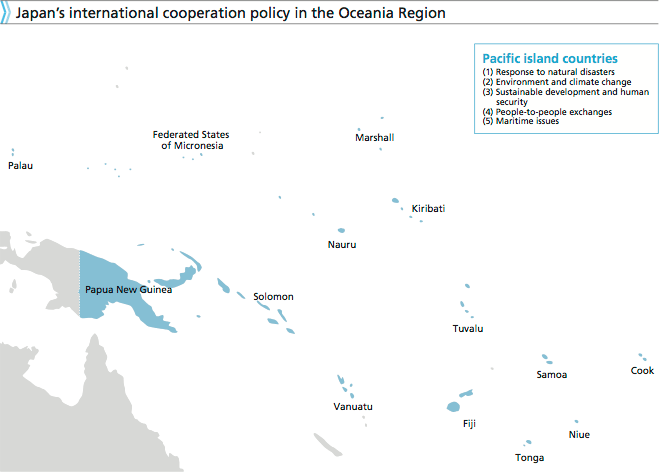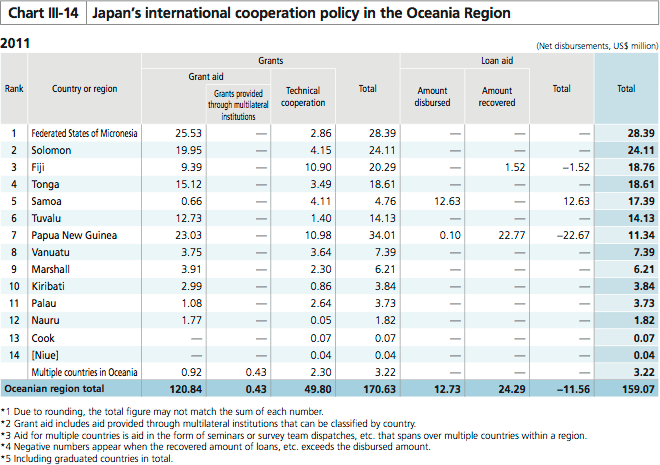Japan's Official Development Assistance White Paper 2012
7. Oceania
The Pacific island countries are not only Japan's "neighbors" that share the Pacific Ocean, but also have historical ties to Japan. Having an enormous Exclusive Economic Zone (EEZ), these countries and regions are the cornerstone of Japan's maritime transport, and they provide important deep-sea fishing grounds for us. Thus the peace and prosperity of the Pacific islands are extremely important to Japan.
Meanwhile, many of the Pacific island countries are newly independent states, and it is urgently necessary for them to establish economically self-reliant nations. In addition, there are common problems such as small-sized economies depending on primary industries, broadly stretched territories, difficult access to the international market, vulnerability to natural disasters, and the risk of land loss because of sea-level rise. Moreover, the region also has issues related to democratization such as political turmoil in Fiji. Based on such circumstances, Japan provides assistance taking into consideration the situation in each country and region, as a good partner to the Pacific islands.
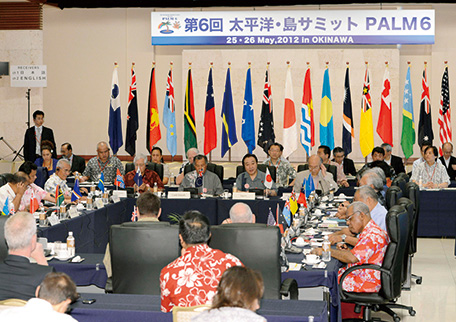
Discussions held at the Sixth Pacific Islands Leaders Meeting (PALM6). (Photo: Kyodo News)
<Japan's Efforts>
To achieve political stability and self-reliant economic development in the Pacific island countries, it is crucial to overcome socio-economic vulnerabilities and to provide cooperation for the entire region. In addition to promoting cooperation with the Pacific Islands Forum (PIF)(Note 21), a framework for regional cooperation composed of the Pacific island countries, Japan holds the Pacific Islands Leaders Meeting (PALM), the summit meeting between Japan and Pacific island countries, held once in every three years since 1997.
The Sixth Pacific Islands Leaders Meeting (PALM6) was held in Nago City, Okinawa in May 2012, under the catchphrase 'We are Islanders - For Growing 'Kizuna' in the Pacific.' At PALM6, Japan committed to making maximum efforts to provide the assistance of up to $500 million over the next three years in order to promote cooperation in the following five pillars: (i) response to natural disasters, (ii) environment and climate change, (iii) sustainable development and human security, (iv) people-to-people exchanges, and (v) maritime issues. Under one of these five pillars, "response to natural disasters", Japan shares lessons from the Great East Japan Earthquake and tsunami and intends to cooperate with the improvement of the Pacific Tsunami Warning and Mitigation System.
The Pacific island countries have development challenges in the areas of the environment/climate change, education, and health. In order to achieve sustainable development of these countries, Japan provides cooperation not only for each individual country, but also for regional cooperation that is beneficial to the entire Pacific region.
For example, in order to improve the capacity of disaster management of Pacific island countries and regions that are vulnerable to the impact of climate change and prone to natural disasters, Japan assists them in developing systems which allow people to evacuate properly. Furthermore, Japan works with the Secretariat of the South Pacific Regional Environment Programme (SPREP), a regional organization located in Samoa, to support the formulation of the Pacific Regional Solid Waste Management Strategy and human resource development in the area of waste management.
Note 21: PIF member countries/regions: Australia, New Zealand, Papua New Guinea, Fiji, Samoa, Solomon Islands, Vanuatu, Tonga, Nauru, Kiribati, Tuvalu, Federated States of Micronesia, Marshall Islands, Palau, Cook, Niue
●Tonga
Great Vava'u and Okinawa Mottainai Movement Project
JICA Partnership Program (Regional Proposal) (September 2011 - Present)
In the Pacific island country of Tonga, due to lifestyle changes and expansion of imports, the amount of waste from plastics containers and private vehicles that the environment cannot process naturally has been increasing. In addition, due to the limited land areas, solid waste management methods become one of social problems. On Vava'u Island, located 300 km away from the capital city of Nuku'alofa in Tongatapu Island, waste disposal is left to households and villages. They make virtually no efforts to establish a solid waste collection system and separate valuables (iron, aluminum, used paper, and other unnecessary items that can be sold).
In island countries, it is not enough to simply establish landfills and educate citizens. These countries also need to establish ways to recycle/export valuables such as cans and bottles, and attempt to reduce waste. In particular, it is important to make exporting these valuables a business in terms of sustainable solid waste management. Okinawa has experienced these in the past.
For that reason, Naha City and the Okinawa Citizens Recycling Movement have taken an active role, taking advantage of the knowledge and experience of Okinawa, to assist in the establishment of a valuables recycling system in Vava'u Island.
(As of December 2012)
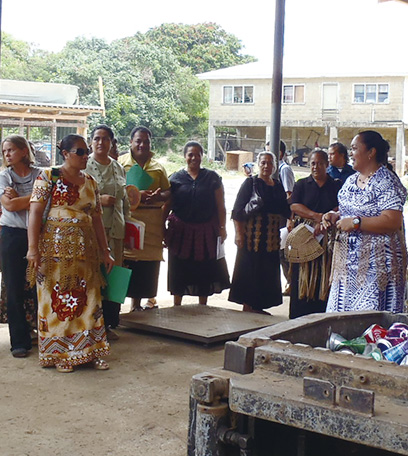
Holding a recycling workshop (Photo: JICA)
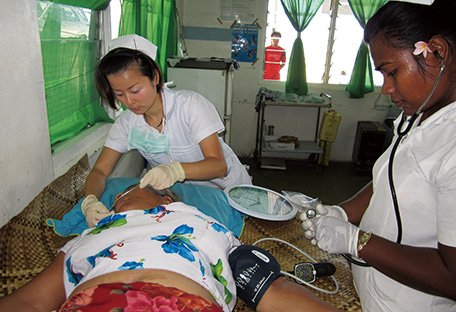
A JOCV works at the emergency outpatient care department at Betio Hospital in Kiribati. (Photo: Fumio Kinoshita)
